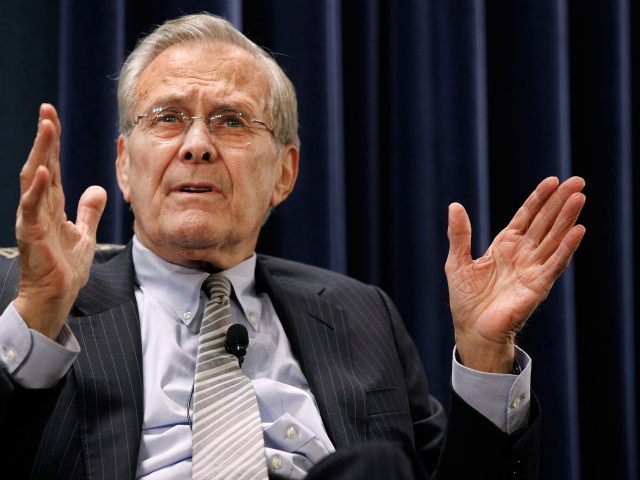I met former Secretary of Defense Donald Rumsfeld only once — at the Conservative Political Action Conference (CPAC) in 2011, back when former George W. Bush administration officials were still welcomed warmly there, barring a few boos from the Ron Paul contingent.
Rumsfeld was signing copies of his memoir, Known and Unknown, inscribing it for my wife, who was then at basic training for the U.S. Navy, in which Rumsfeld served with distinction for decades.
Rumsfeld, who died this week at 88, came across tough, but, the title of his memoir was a testament to his sense of humor. It alluded to one of his infamous press briefings, when he was asked about “reports” that there was no evidence Iraqi dictator Saddam Hussein was supplying terrorists with weapons of mass destruction. Rumsfeld responded:
Reports that say that something hasn’t happened are always interesting to me, because as we know, there are known knowns; there are things we know we know. We also know there are known unknowns; that is to say we know there are some things we do not know. But there are also unknown unknowns — the ones we don’t know we don’t know. And if one looks throughout the history of our country and other free countries, it is the latter category that tend to be the difficult ones.
Critics were baffled — and impressed, calling Rumsfeld’s words “existential poetry.” Slate.com rewrote the latter passage as such:
The Unknown
As we know,
There are known knowns.
There are things we know we know.
We also know
There are known unknowns.
That is to say
We know there are some things
We do not know.
But there are also unknown unknowns,
The ones we don’t know
We don’t know.
Some critics even set Rumsfeld’s words — plainspoken midwestern wisdom, and oddly arresting — to music. Rumsfeld took the world seriously, perhaps too seriously — but at least he was big enough to enjoy the joke, directed at himself.
To many, the substance of the question behind “unknown unknowns” was no laughing matter. The search for weapons of mass destruction in Iraq turned up largely empty — thousands of American lives later. While the public still backed the war in Afghanistan as a response to the terror attacks of Sep. 11, 2001, the Iraq War was one of pre-emption and choice, a calculated risk that came up empty. Iraq was freed, but Iran — a more serious threat — filled the vacuum, sowing chaos.
Rumsfeld was vilified for his role in directing the war. He was also hated by many in the Pentagon and the Washington establishment for streamlining the military, pushing it to achieve more with less.
That policy came back to haunt him later, when the U.S. was ill-prepared to fight the insurgency that arose after the fall of Saddam. As troops were forced to scavenge for scrap metal to protect their vehicles from bombs, Rumsfeld said: “You go to war with the Army you have.”
Still, Rumsfeld was one of the only people in Washington — then, and now — to accept responsibility when things went wrong. He offered to resign after reports of prisoner abuse in Abu Ghraib in 2004, and did resign after Democrats swept the 2006 midterm elections on public fatigue with the war.
It was a sad end to an illustrious career.
He was the oldest Secretary of Defense when he resigned at 74 — but he was also the youngest, during the Ford administration, at 43.
Rumsfeld also served in Congress, representing suburban Chicago, and enjoyed success as an executive in the private sector, notably the Searle pharmaceutical company.
He was considered so talented that Senator Daniel Patrick Moynihan, Democrat of New York, once said of him: “I wish him the presidency one day, partly because he would be splendid at it.”
But Rumsfeld never would be president: he was too interested in doing the work, and taking the risks, and the blame.
Rumsfeld was what would later be called “based,” a word the Urban Dictionary defines as “courageous and unique or not caring what others think.”
He shared that in common with Donald Trump — whom Rumsfeld, unlike much of the Bush world and the Republican establishment, endorsed for president in 2016 in an interview with Breitbart News, saying it was not even a “tough call.” Like Trump, Rumsfeld made bold moves, and defended them. As with Trump, it had a cost.
Even in retirement, Rumsfeld made an impact. He released a mobile game, “Churchill Solitaire.” Churchill was ousted by British voters after winning World War II.
That was the price of leadership, a price Rumsfeld accepted with good humor.
Joel B. Pollak is Senior Editor-at-Large at Breitbart News and the host of Breitbart News Sunday on Sirius XM Patriot on Sunday evenings from 7 p.m. to 10 p.m. ET (4 p.m. to 7 p.m. PT). He is the author of the recent e-book, Neither Free nor Fair: The 2020 U.S. Presidential Election. His recent book, RED NOVEMBER, tells the story of the 2020 Democratic presidential primary from a conservative perspective. He is a winner of the 2018 Robert Novak Journalism Alumni Fellowship. Follow him on Twitter at @joelpollak.

COMMENTS
Please let us know if you're having issues with commenting.